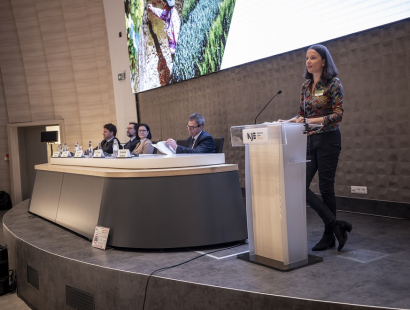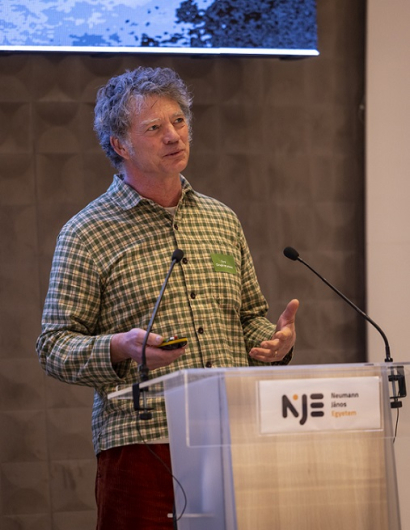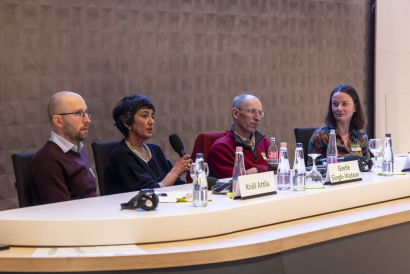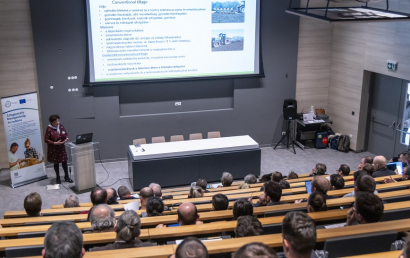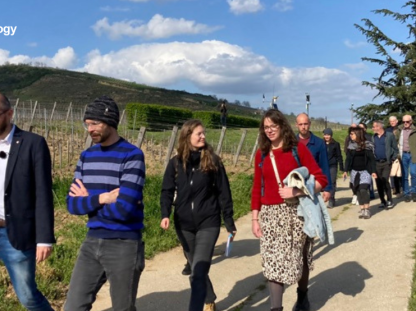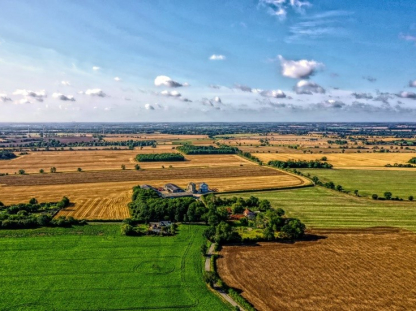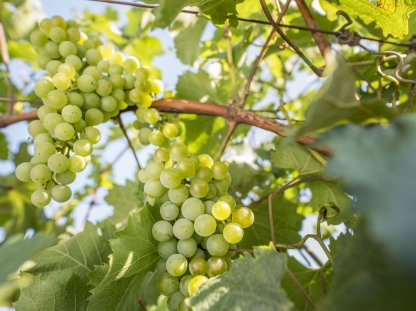Inspiration, science and innovation: how the future of the organic farming industry is shaping up
On 28 February 2023, the Research Institute of Organic Agriculture (ÖMKi) for the fourth time organized the Organic Agriculture – Sectoral Conference, which on this occasion was hosted in Kecskemét, at the Neumann János University CAMPUS. The goal of the conference was to share and discuss the most important opportunities, challenges and experiences that are determining the future of organic farming, with an inspirational overview of the most outstanding international practices.
Visitors to the one-day conference were able to participate in various professional programs, inspiring lectures given by domestic and international speakers, and workshops allowing for the exchange of ideas and experiences. The event was attended by 500 farmers, consultants, researchers, students and practitioners, all eager to learn more about the latest trends in organic farming. It was hosted in one of the most innovative university buildings in the country, the Kecskemét CAMPUS.
In his introductory address, Szabolcs Szemerey, the Strategic Director of the János Neumann University Foundation, who is himself an organic farmer, emphasised the importance of training experts with the most relevant and up-to-date knowledge. He emphasized that, learning from their namesake János Neumann, they think in terms of fusions, and believe that all aspects of knowledge, technology, design, sustainability and creativity can be connected:
‘We do not follow the classic paths, but instead create knowledge centres that embrace everything from artificial intelligence and sustainability to organic farming. We are confident that here in Kecskemét, in the land of apricots, we can set the higher education sector on a path of development, the focus of which is a long-term, sustainable model of operation, management, research and career progression.’
In her introductory address, Dr Dóra Drexler, the Director of the Research Institute of Organic Agriculture, which organized the event, stressed the importance of the conference itself, and of participatory research:
‘2022 made it clear to everyone that we have to change our standard methods of production. Whether we are thinking about the effects of climate change, the price of energy and input materials, or the higher environmental expectations of the new Common Agricultural Policy which has entered into force in 2023, we see that organic farmers have a competitive advantage. They can set an example and provide solutions for non-organic producers as well. It is therefore of utmost importance to share good practices with each other, to think together about where and in what sectors technological development, research and innovation are needed, and to take advantage of the opportunities created by difficult crisis situations and increased funding sources: let's work together to ensure the future success of organic agriculture!’
The conference was opened by Dr Anikó Juhász, Deputy State Secretary of the Ministry of Agriculture. In her speech, she stressed that
‘Hungary's goal is to double the size of domestic organically cultivated areas by 2027, to reach a 10 percent organic area ratio.’
She emphasized that the Ministry of Agriculture treats the preservation of biological diversity and, in this connection, support for organic farming, as matters of the utmost importance. With the help of the Ministry, the use of extremely dangerous plant protection agents and fertilizers can be reduced, while at the same time ensuring that soil productivity is not compromised. In recent years, as in other countries around the world, the size of the area under organic cultivation has increased significantly in Hungary (reaching 330,000 hectares in 2022), as has the number of farms engaged in organic farming, which has now risen to over 6,700.
Domestic and international best practices
As a special feature of this year's event, several inspiring foreign guest speakers shared their knowledge and experiences with the participants. The international guests at the conference included an English couple who are very popular in the field of organic gardening and sustainable gastronomy, Geetie and Guy Singh-Watson, who have set an example of a successful organic business model through their personal stories.
Guy Singh-Watson, an organic gardener and founder of Riverford Farm and Community in England, who built a national organic vegetable box community out of his small family business, then sold his company to his employees instead of investors. Through his own life story, he showed how much family tradition matters in the life of a farmer, and what the initial challenges of his business were. In addition to the successes, he spoke with touching honesty and endless optimism about the mistakes and difficulties, but especially about the thirty-five-year ‘journey’ through which he reached a point where he now works with 1,000 employees (and co-owners) to supply 70,000 customers a week with organic vegetables grown on the farm.
As a final thought at the end of his inspiring presentation, Guy Singh-Watson said:
‘We need to be more moderate in many areas of our lives, and I believe that we can live on less, and that we should also think about our future and share what we have with others. I am optimistic about our future if we are able to do that.’
‘Local, seasonal and organic food – is it possible in practice?’ Geetie Sing-Watson, Matthew Hayes, the founder of the Zsámboki Biokert (Zsámbok Organic Garden) and the first Hungarian vegetable box community, and biologist and ecologist Attila Králl, an expert at Agri Kulti, discussed the issue at a round-table discussion. The conversation was moderated by the director of ÖMKi, Dr Dóra Drexler.
Attila Králl, who himself participated in the development of the so-called Symbioo project, pointed out that ‘there is no properly functioning gastronomy without properly functioning agriculture … In the project, we create virtual kitchen gardens for city restaurants. In the cultivated gardens, the farmers always produce fresh, seasonal ingredients of guaranteed quality, according to the needs of local chefs. The chef plans in advance for the entire season, and the producers plant, care for and harvest the delicious domestic ingredients tailored to those needs’. Attila Králl also emphasised the importance of cooperation between farmers and those in the gastronomy sectory.
The discussion partner from England, Geetie Singh-Watson, was an ethical gastro-entrepreneur, and the founder of the first organic restaurant in London, the DUKE of CAMBRIDGE (1998) and the organic pub THE BULL INN & ALBATROSS (2019). In 2009, in Britain, she was voted businesswoman and entrepreneur of the year. At the conference, she spoke about the importance and feasibility of local, seasonal, and organic food. Learning from her own experiences in England, Geetie Sing-Watson encouraged the Hungarian audience to dare to ask where the ingredients used in the preparation of dishes come from when eating out. Based on her opinion and experience, this brave consumer attitude can help gastronomy to move in a sustainable direction and also help drive more conscious customer behaviour.
Dr Knut Schmidtke, a professor at the University of Dresden and director of the Swiss Research Institute of Organic Agriculture (FiBL), and also a practical specialist in organic arable farming, visited our country for the second time in a short period. In November 2022, he gave a very successful practical seminar in Szár. This time, he examined opportunities for climate-neutral agriculture, based on the latest German and Swiss research results comparing conventional and organic farming methods. In addition to organic farming, he presented some practical methods for reducing carbon emissions, such as the use of agroforestry methods, so-called agri-voltaic farming systems connected with solar shading, and the use of biochar.
Popular and innovative topics from ÖMKi speakers
In the parallel sectoral conference discussions, the horticultural and arable sections once again attracted the most interest. In the arable section, the participants this time were given an overview of the relationship between regenerative agriculture and organic farming. In addition to emphasizing the key importance of soil quality, there was also talk about the certification options for regenerative organic farming, for which there is already a working example in the United States. The second section concerned the importance of plant species and varieties grown in organic farming, i.e. the biological foundations, and the latest results of the National Organic Variety Testing Network ÖMKi-VSZT-NÉBIH.
In the expert consultation section, the CAPTIVATE project was introduced by experts from the two Hungarian partner institutions, ÖMKi and the János Neumann University. The goal of the project is to develop a farmer-centred evaluation and training system that connects the ‘green’ requirements of the CAP with proven and innovative farming practices.
In the lectures given at the animal husbandry section, the youngest research area of ÖMKi was presented, and through this, the role and usefulness of digitization in organic animal husbandry. As an example, they reported in detail about the initial difficulties, results and lessons learned from their experiment, which began in 2019 at a beef cattle farm in Várvölgy, and was conducted on more than 120 cows and their calves.
The research section presented the methodology of participatory on-farm research known as the Living Lab, which now plays a central role in the EU's research objectives. The operation of so-called lighthouses and research infrastructures (RI), and the expected EU financing instruments and networks that help the practical implementation of the agroecological transition, were explained. ÖMKi, as the coordinator of the European Agroecology Living Laboratories and Research Infrastructures network, plays a central role in this process.
